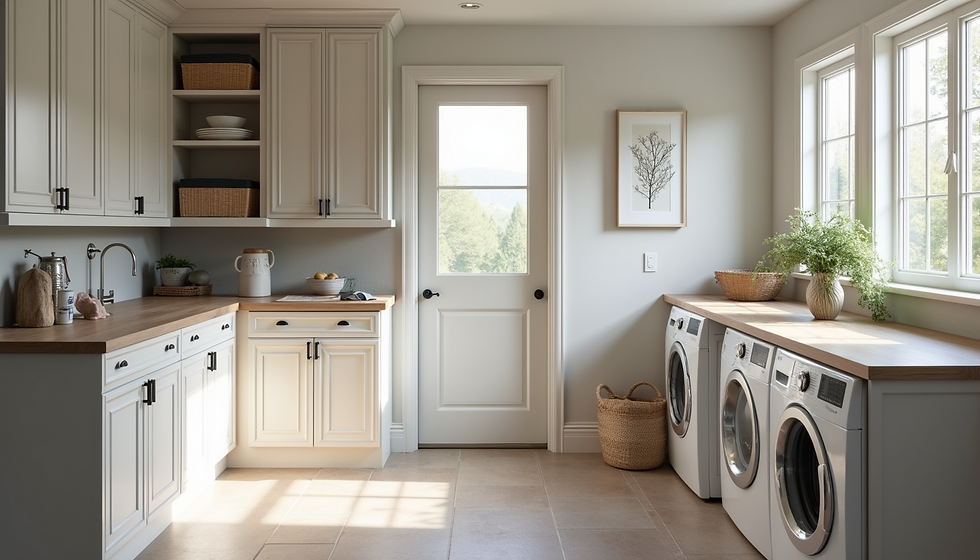From Vision to Value: Estimating Your Remodeling Project
- The Home Tuner
- Jun 23, 2025
- 4 min read
Updated: Jul 25, 2025
Remodeling your home can be a thrilling adventure filled with thoughts of new designs, vibrant colors, and modern features. However, transforming that dream into reality requires careful planning and a detailed estimate of remodeling costs. Whether you're a homeowner ready to refresh your space or a realtor helping clients improve their property's value, understanding how to accurately estimate remodeling expenses is essential.
This guide will provide practical insights and strategies to help you navigate the budgeting landscape of your remodeling project.
Defining Your Vision
Before getting into the numbers, it’s crucial to have a clear understanding of your remodeling vision.
What exactly do you want? Is it a bathroom that feels like a luxurious spa, a kitchen designed for culinary masterpieces, or an outdoor patio perfect for gatherings?
Take the time to outline your goals. For example, if you want an open-concept kitchen, think about how you'll use that space. Will it include an island with seating for six? Surveying your options will lead to more accurate estimates.
Collect inspiration from home improvement magazines, websites, or Pinterest boards. Choose images that reflect your style and organize them by room or theme. This visual collection will not only inspire you but also serve as a helpful reference when discussing your plans with professionals.
Laying Out Your Budget
Once your vision is clear, it’s time to establish your remodeling budget.
Your budget should reflect your ambitions while also considering your financial reality. According to the National Kitchen & Bath Association, kitchen remodels typically cost between $12,000 and $35,000, while bathroom renovations can range from $10,000 to $25,000, depending on the complexity and materials used.
Key budget considerations include:
Materials: The type and quality of materials greatly influence costs. For instance, while granite countertops may cost around $50 to $100 per square foot, laminate options start as low as $10 per square foot.
Labor: Skilled labor varies in price. Engaging seasoned contractors can cost between $60 to $140 per hour but may save you from potential costly errors in execution.
Permits and Fees: Depending on your local regulations, permits might cost anywhere from $100 to $1,000. Checking with local authorities will help you factor these into your budget early on.
As a rule of thumb, it's wise to set aside an additional 10 to 20 percent of your budget to cover unexpected expenses.
Crafting a Detailed Project Estimation
With a clearer vision and a solid budget, you can create a detailed project estimation guide.
Divide by Room: List each area you plan to remodel and create estimates for each one.
Break Down Costs: For each area, outline specific costs, including labor and materials. Using a spreadsheet can help keep this organized.
Gather Quotes: Solicit estimates from a minimum of three contractors and suppliers. This ensures you have a range of costs and can make informed choices.
Factor in Time: Consider how long each part of the project will take. Some renovations can last weeks or months, potentially impacting your daily routine and living conditions.
Smart Strategies for Managing Remodeling Costs
Managing remodeling expenses may seem overwhelming, but there are effective strategies to keep costs reasonable while still achieving your vision.
Reuse and Repurpose
A great way to save money is by reusing existing materials and structures. A vintage dresser can be easily refurbished and transformed with a fresh coat of paint instead of purchasing new furniture.
DIY When Possible
If you or any family members have a knack for home improvement, consider tackling simpler projects yourself. This could include straightforward tasks like painting, landscaping, or even installing backsplash tiles in a kitchen. Just be cautious not to take on projects beyond your skill level, as they could complicate the renovations.
Track Material Prices
Material costs can fluctuate. Stay informed on market trends and try to plan your purchase around sales or discounts at local hardware stores. For example, buying your flooring during a holiday sale can save you 20% or more.
The Importance of Communication
During your remodeling project, clear communication with your contractors and team members is vital for managing expectations. Regular updates will help keep everyone aligned and can help prevent issues down the line.
Regular Progress Check-ins
Make checking in a routine. Request updates on project status and any unexpected challenges. This will allow for real-time adjustments to your remodeling cost estimates.
Assessing Your Investment
After completing your remodel, it's essential to evaluate the added value to your home.
A well-executed remodel can significantly boost your home's market value. According to Remodeling Magazine’s Cost vs. Value report, kitchen remodels recoup an average of 76% of their cost upon resale, while bathroom remodels recoup about 70%.
In conclusion, a successful remodel not only enhances your living space but can also provide a strong return on investment when it comes time to sell your home.

Final Thoughts
Estimating your remodeling project doesn't have to be intimidating. With a well-defined vision, a realistic budget, and careful planning, you can turn your remodeling dreams into reality.
Understanding how to manage costs while maximizing your investment is essential for enjoying your updated space and increasing its overall value.
Whether your goal is personal satisfaction or potential resale gains, this estimation guide arms you with practical tools to transform your vision into value. Enjoy the transformation process, and watch your dreams come to life!




Comments